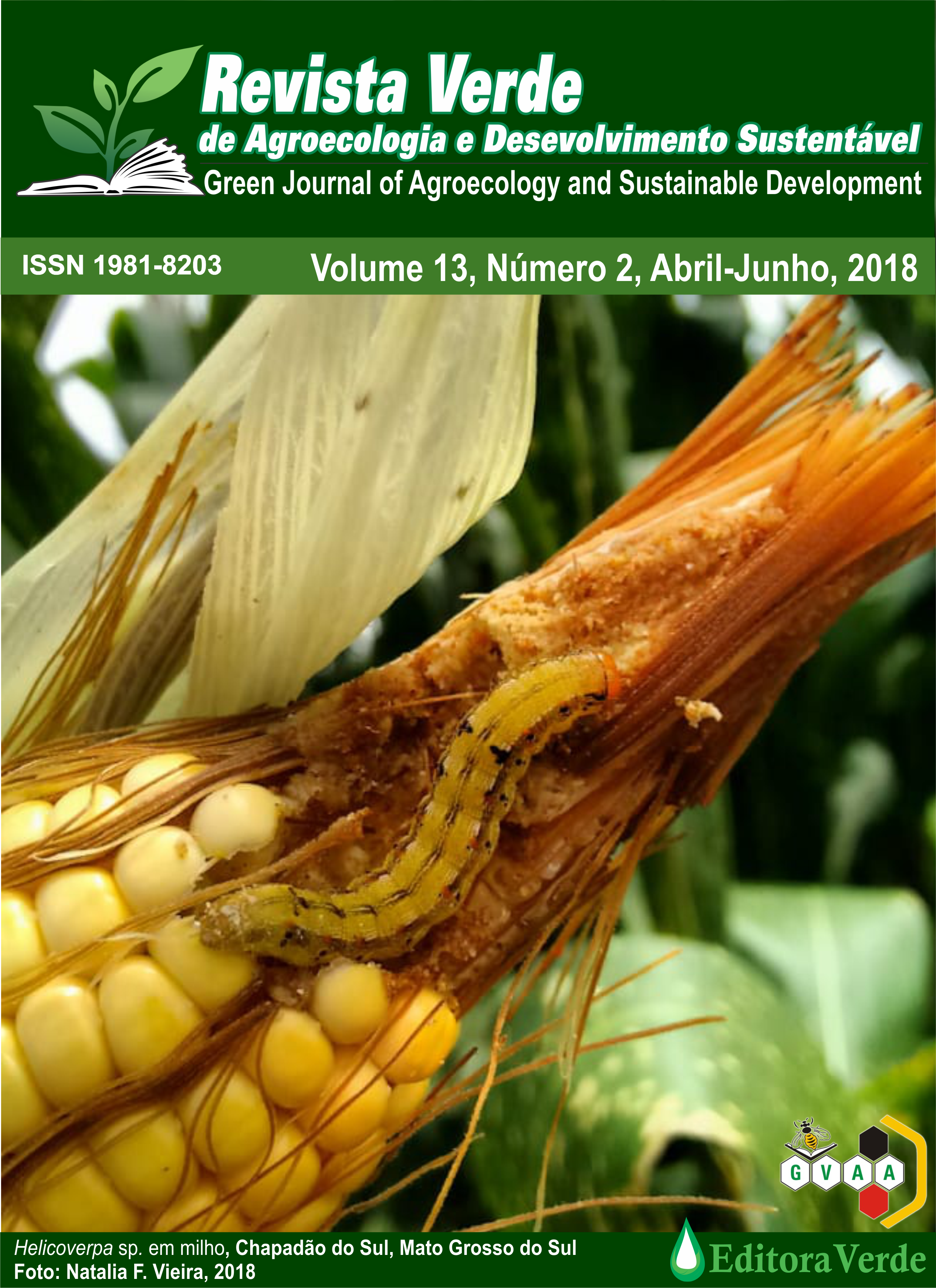Ovicidal and repellent activity of citronella powder on cowpea-bean weevil
DOI:
https://doi.org/10.18378/rvads.v13i2.5157Keywords:
Botanical insecticides, Vigna unguiculata, Cimbopogon nardusAbstract
The rot Callosobruchusmaculatus (Fabr.) is considered the main pest of grains and stored seeds of cowpea-been, as it causes direct and indirect damages, which can lead to quantitative and qualitative losses, making commercialization or consumption impossible.To the control of this pest, synthetic insecticides we have been used, which over the years have caused many problems to human health and to the environment.Botanic insecticides have become a promising alternative in the control of pests on stored grains.The objective of this work was to evaluate the ovicidal and repellent activity of citronella, Cymbopogonnardus, on C. maculatus.In the confinement experiment, the insects were kept for 24 hours in a container containing 10g of cowpea beans cv. BRS Guariba with concentrations 1.0g; 0.1g; 0.01g; 0.001g of the powder of the referred species and witness (grain without dust), and in the repellency experiment, a six-way arena was used, where the insects had the possibility to choose between the grains with the tested concentrations or witness. The delimitationused was completely randomized with five replicates and five treatments for the two experiments.The concentration of 1.0g of the citronella powder presented ovicidal and repellent activity to C. maculatus, allowing, on average, a lower number of eggs laid and an unexpressive appearance of insects when compared to the other concentrations and control.Downloads
References
ALVES, M. S.; SANTOS, D. P.; SILVA, L. C. P.; PONTES, E. G. ; SOUZA, M. A. A. Essential oils composistion and toxicity tested by fumigation against Callosobruchus maculatus (Coleoptera: Bruchidae) pest of stored Cowpea. Revista Virtual de Química. v.7, n.6, p.2387-2399, 2015.
AZEVEDO, F. R.; LEITÃO, A. C. L; LIMA, M. A. A. Eficiência de produtos naturais no controle de Callosobruchus maculatus em feijão-caupi (Vigna unguiculata(L.) Walp.) armazeanados. Revista Ciência Agronômica, v.38, n.2, p.182-187, 2007.
COUTINHO, P. W. R.; SILVA, D. M. S.; SALDANHA, E. C. M.; OKUMURA, R. S.; SILVA JUNIOR, M. L. Doses de fósforo na cultura do feijão-caupi na região nordeste do Estado Pará. Revista Agro@mbiente on line, v.8, n.1, p.66-73, 2014.
CRUZ, C. S.; PEREIRA, E. R. L.; MELO, S. L. M.; MEDEIROS, M. B.; GOMES, J. P. Repelência do Callosobruchus maculatus (Coleoptera: Bruchidae) sobre grãos de feijão-caupi tratados com óleos vegetais. Revista Verde de Agroecologia e Desenvolvimento Sustentável, v.7, n. 3, p. 1-5, 2012.
FILGUEIRAS, G. C.; SANTOS, M. A. S.; HOMMA, A. K. O.; REBELLO , F. K.; CRAVO, M. S. Aspectos socieconômicos.In: ZILLI, J. E.; VILARINHO, A. A.; ALVES, J. M. A. Acultura do feijão-caupi na Amazônia brasileira. Boa Vista, Embrapa Roraima, 2009. P.23-58.
FONSECA, M. R.; FERNANDES, A. R.; SILVA, J. R.; BRASIL, E. C. Teor e acúmulo de nutrientes por plantas de feijão-caupi em função do fósforo e da saturação por bases. Revista de Ciências Agrárias, v.53, n. 2, p.195-205, 2010.
FRANÇA, S. M.; OLIVEIRA, J. V.; ESTEVES FILHO, A. B.; OLIVEIRA, C. M. Toxicity and repellecy of essentialWill to Zabrotes subfaciatus (Boheman) Coleoptera, Crisomelidea Bruchinea in Phaseolus vulgares L. Acta Amazônica, (on line), v.42, n.3, p. 381-386, 2012.
FREIRE FILHO, F. R.; RIBEIRO, V. Q.; ROCHA, M. M.; SILVA, K. J. D.; NOGUEIRA, M. S. R.; RODRIGUES, R. V. Feijão-caupi no Brasil: produção, melhoramento genético, avanços e desafios. Teresina: Embrapa Meio-Norte, 2011. 84 p.
FROTA, K. M. G.; SOARES, R .A. M.; ARÊAS, J. A. G. Composição química do feijão-caupi (Vigna unguiculata L.) Coleoptera: Bruchidae) em feijão armazenado. Neo-Tropical Entomology, Entomology, v.51, n.2, p.45-66, 2008.
GALLO, D.; NAKANO, O ; SILVEIRA-NETO, S.; CARVALHO, R. P. L.; BATISTA, G. C.; BERTI FILHO, E. PARRA, J. R. P.; ZUCCHI, R. A.; ALVES, S. B.; VENDRAMIM, J. D. ;MACHINI, L. C.; LOPES, J. R. S.; OMOTO, C. Entomologia Agrícola. Piracicaba: FEALQ, 2002, 920p.
GIRÃO FILHO, J. E.; ALCÂNTARA NETO, F; PÁDUA, L. E. M.; PESSOA, E. F. Repelência e atividade de pós vegetais sobre Zabrotes subfasciatus (Boheman) em feijão-fava armazenado. Revista Brasileira de Plantas Medicinais, Campinas, v.16, n.3, p.499-504, 2014.
ISMAN, M. B. Botanical insecticides, deterrents, and repellents in modern agriculture and increasingly regulated world. Annual Review of Entomology, v.51, p.45-66, 2006.
LIMA-MENDONÇA, et al. Efeito de pós-vegetais sobre Sitophilus zeamais (MOTS., 1855) (COLEOPTERA: CURCULIONIDAE). Arquivos do Instituto Biológico, 80 (1), 91-97, 2013
MAZZONETO F.; VENDRAMIM. J. D. Efeito de pós de origem vegetal sobre Acanthocelides obtectus (Say) (Coleoptera: Bruchidae) em feijão armazenado. Neotropical Entomology, v.32, n.1, p.145-149, 2003.
MELO, B. A.; MOLINA-RUGAMA, A. J.; LEITE, D. T.; GODOY, M. S.; ARAUJO, E. L. Bioatividade de pós de espécies vegetais sobre a reprodução de Calllosobruchus maculatus (Coleoptera: Bruchidae). Bioscience Journal, v.30, n.3, p.346-353, 2014.
OLIVERO-VERBEL, J.; CABALLERO-GALLARDO, K; JARAMILLO- COLORADO, B.; E. E. STASHENKO, E. Actividad repelente de los aceites essenciales de Lippia origanoides, Citrus sinenses y Cymbopogon nardus cultivadas em Colombia frente a Tribolium castaneum Herbst. Revista de La Universidad Industrial de Santander, v.41, n.3, p.244-250, 2009.
PIMENTEL, M. A. G.; FARONI, L. R. D. A.; SILVA, F. H.; BATISTA, M. D.; GUEDES, R. N. C. Spread of phosphine resistance among brazilian populations of three species of stored products insects. Neotropical Entomology, v.39, n.1, p.101-107, 2010.
PROCÓPIO, S. O.; VENDRAMIM, J. D.; RIBEIRO JÚNIOR, J. I.; SANTOS, J. B. Bioatividade de diversos pós de origem vegetal em relação ao Sitophilus zeamais Mots.(Coleoptera: Curculionidae). Ciencias Agrotecnica. v. 27, n.6, p.1231-1236, 2003.
RAJENDRAN, S.; SRIRANJINI, V. Plants products as fumigants for stored – products insects control. Journal Stored Products Research. v.44, n.2, p.126-135, 2008.













